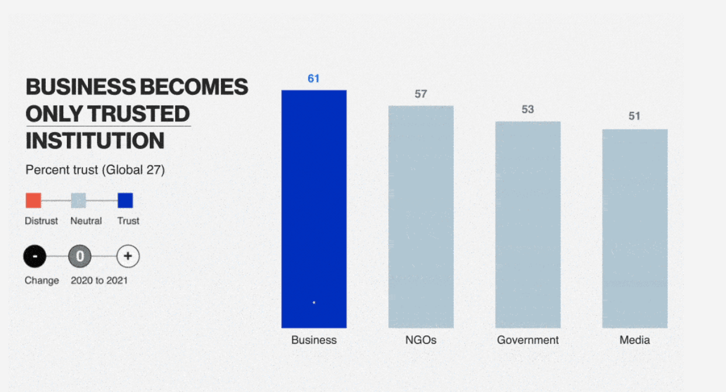Edelman Trust Institute Will Focus on Building Much-Needed Public Trust
Global communications firm Edelman, widely known for its annual Edelman Trust Barometer report, has...

2021 research on the topic of brand trust, like seemingly everything else these days, is polarizing.
On the one hand, the global PR agency Edelman—via its annual Edelman Trust Barometer report—says that while trust in government and the media are down, the public's relatively high level of trust in businesses and CEOs is its survey's bright spot.
On the other hand, global agency Havas Media Group—via its annual report on brand value—headlined its study by proclaiming that brand trust is at an all-time low.
So, what's the truth—and what's the takeaway for brands?
Edelman Study Touts Brand Trust Over Trust in Government and the Media
In the PR world, the Edelman Trust Barometer is the grandaddy of formal trust research—having recently celebrated two decades of global surveys of public trust in government, media, corporations and other institutions. This year, the annual report spawned the launch of the Edelman Trust Institute.
For the PR agency's 2021 report, Edelman conducted interviews with more than 33,000 respondents across 28 countries in the form of a 30-minute online survey. The surveys targeted the general public along with a subset of "informed" respondents who met the following criteria: aged 25-64, college-educated; household income in the top percentile for their age in their country; read or watch business/news media at least several times a week; and followed public policy issues in the news at least several times a week.
The 2021 survey is unique because it factors in the world’s response to the COVID-19 pandemic as well as highly polarized issues such as systemic racism, police brutality, gaps in healthcare, and the increasing wealth divide. Perhaps as a result, the overarching theme of the study was that people don’t know who to trust. The majority of respondents felt they are constantly being fed false information, with government officials the least trusted source of all.
“This is the era of information bankruptcy,” said Richard Edelman, CEO of Edelman. “We’ve been lied to by those in charge, and media sources are seen as politicized and bias. The result is a lack of quality information and increased divisiveness.”
Businesses Have 'Seized the High Ground of Trust,' Says Edelman
Edelman points out that social-media phenomena such as virus conspiracy theories and polarizing events such as the Jan. 6 attack of the U.S. Capitol have only increased public distrust: “Fifty-seven percent of Americans find the political and ideological polarization so extreme that they believe the U.S. is in the midst of a cold civil war,” he notes.
So who does society trust? According to the report, business has emerged as the most trusted institution, surpassing government, non-profit groups and the media. This tracks with a trend of increasing trust in business in Edelman's studies over several years.

“Business seized the high ground of trust by proactively developing vaccines in record time and finding new ways to work. Trust continues to move local, with respondents placing even higher reliance on ‘my employer’ at 76 percent, and ‘my employer CEO’ at 63 percent,” the report states.
Most respondents stated that communications from their employer was their most trusted source of information, beating out government information, traditional media, and social media.
This elevated level of trust for business crosses party lines in the U.S. The data found that 61 percent of Trump voters believe their employer’s CEO is the only societal leader they can trust. Among Biden voters, that number rose to 68 percent.
Havas Says Nah: Agency Claims Brand Trust Is Actually on the Decline
According to the 2021 Havas Media Group report, meanwhile, "we’ve entered the 'age of cynicism,' and brand trust is at an all-time low," per Morning Brew.
The report's insights include these nuggets:
Stephanie Nerlich, CEO of Havas Creative, said that the survey "uncovered deepening cynicism alongside a growing expectation gap in consumers’ relationships with brands and businesses. Consumers’ faith in brands, and loyalty toward them, continues to wane—especially if a company’s values don’t align with theirs."
The report, now in its 12th year, surveyed 395,000 people globally.
Where They Agree: Brands Must Do More
While the reports offer differing narratives on the current state of brand trust, the agencies agree on two key points:
According to Edelman's report, about eight in 10 respondents want CEOs to speak out on issues such as social injustice. More than two-thirds of respondents expect a CEO to step in to fix a problem when the government refuses to act.
“There is a void in leadership that CEOs must fill,” said Dave Samson, Edelman's vice chairman of corporate affairs. “It starts with a broader mandate for business that focuses on societal engagement with the same rigor used to deliver on profits."
Said Havas' Nerlich: "73% of people said brands must act now for the good of society and the planet, and 77% of consumers expect brands to show support to people in times of crisis—presenting a huge opportunity for businesses and brands to authentically drive the meaningful and sustainable action people are so desperately seeking."
The bottom line for both studies is this: even though social turmoil has calmed a bit since the November election, this is no time for businesses to slack off. Companies should focus on building brand trust if they want to stay ahead. Find out what’s important to your employees and customers and then act on it. Chances are, they’re already waiting for you to raise your voice.

Tobi Laukaitis is a writer for Trust Signals.

Global communications firm Edelman, widely known for its annual Edelman Trust Barometer report, has...

Who do you trust more: the government or a large corporation? If you’re anything like the average...
Leave a Comment